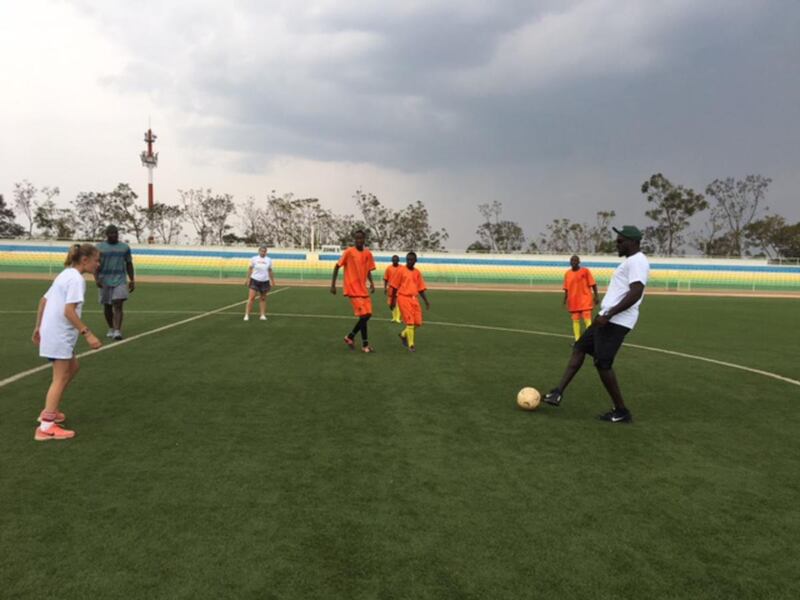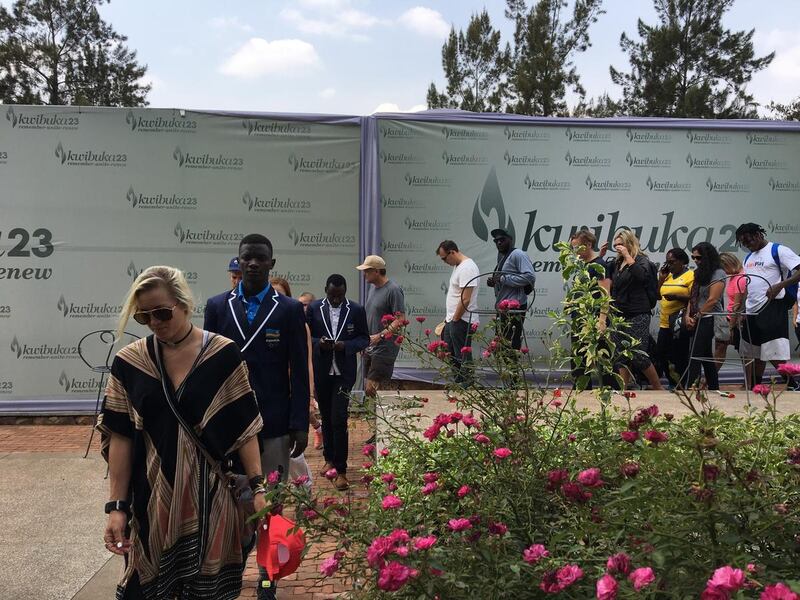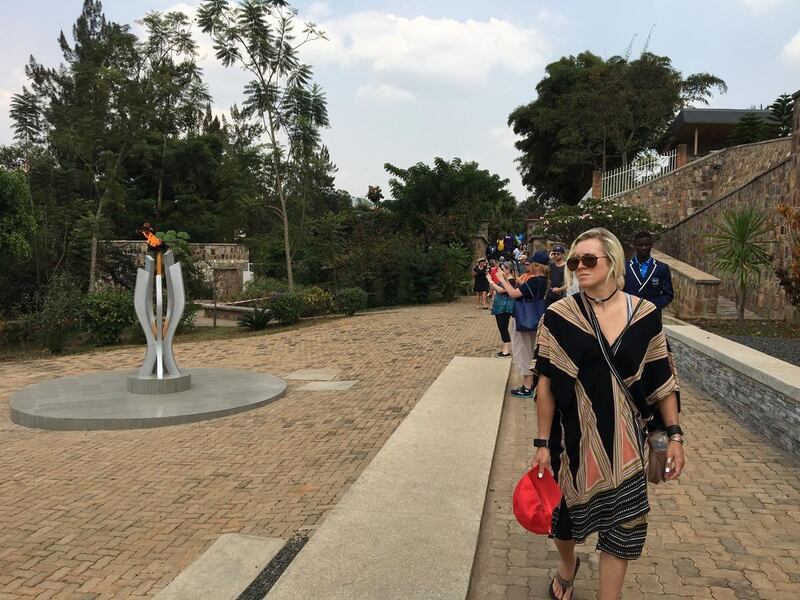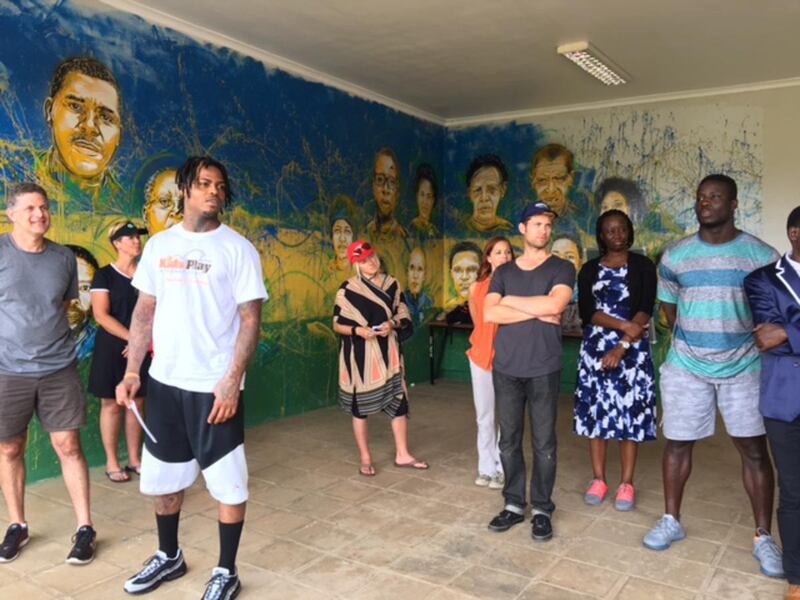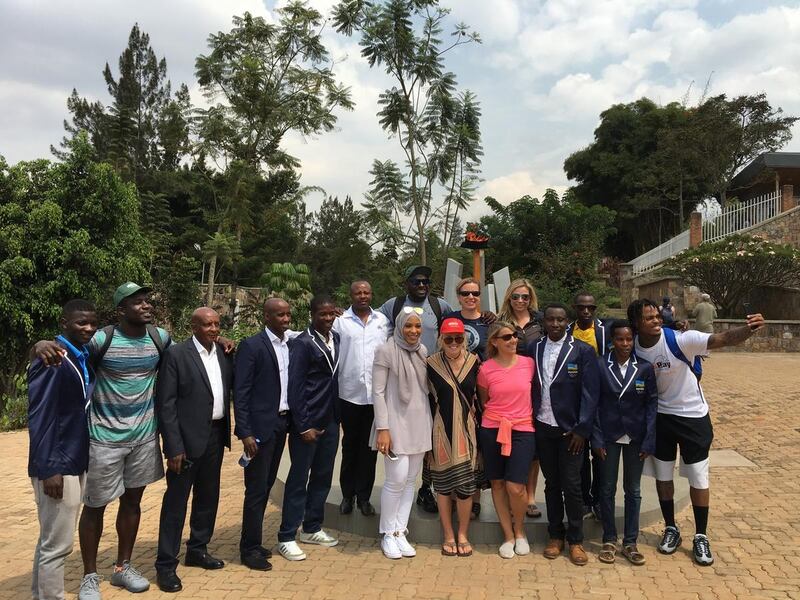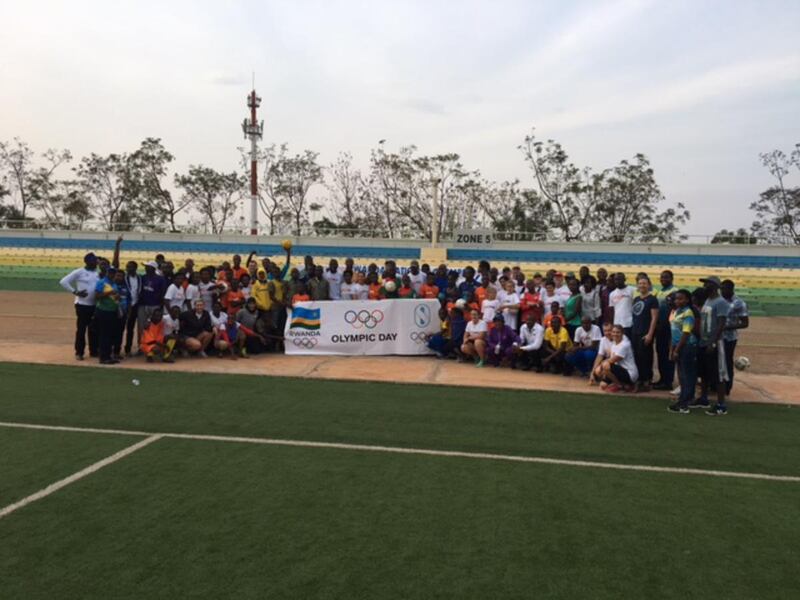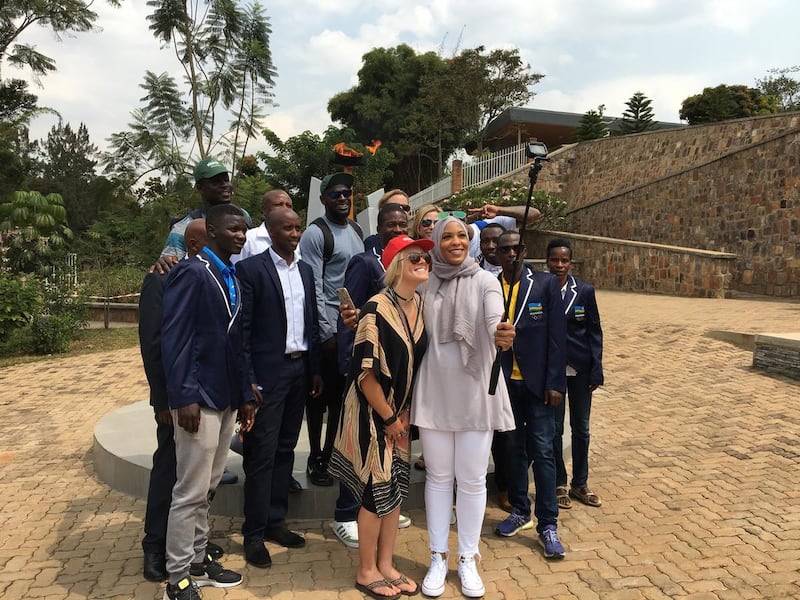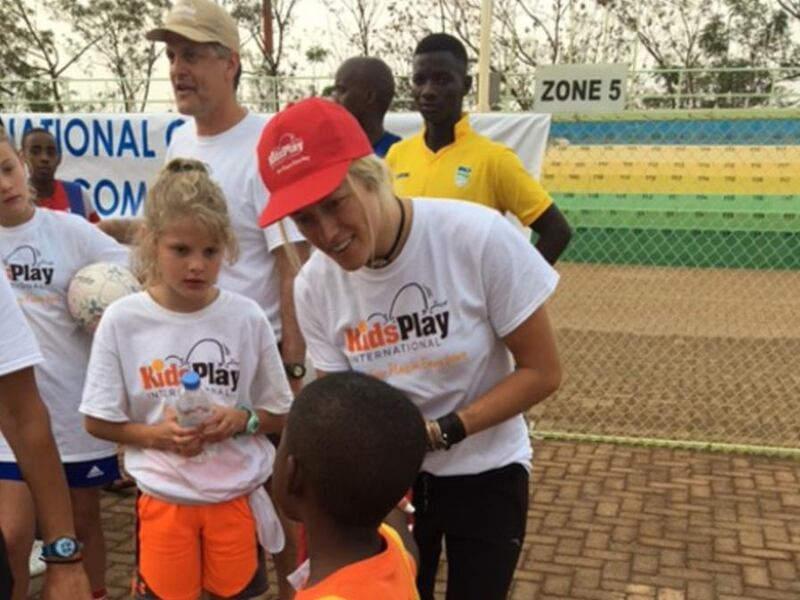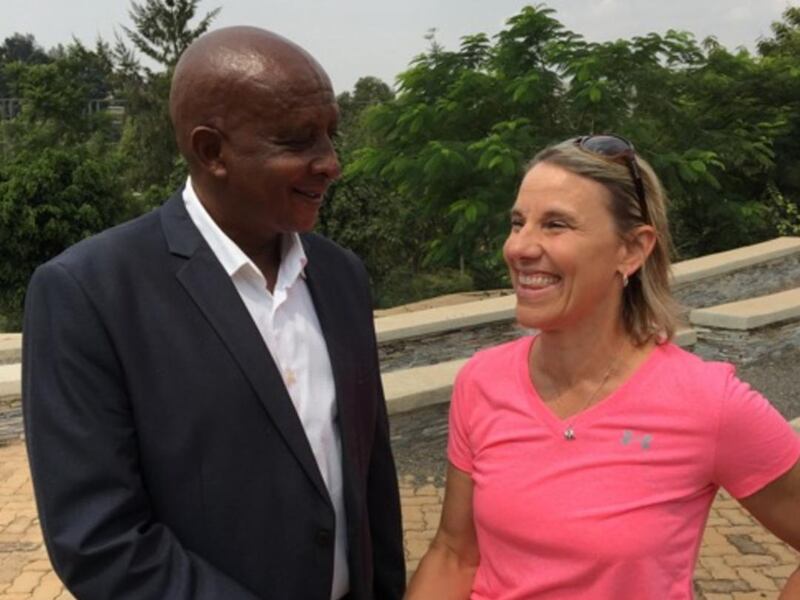KIGALI, Rwanda — Two-time Olympian Faye Gulini saw the faces of the children first.
They were toddlers and kindergartners and pre-teens grinning at her from color photographs provided by family members who managed to do what these little children did not — survive the Rwandan Genocide of 1994.
The Cottonwood Heights native spent two hours touring the memorial with Kids Play International, an organization started by three-time Olympian and Park City resident Tracy Evans in 2010, that uses sports to discuss, challenge and teach gender-equity issues.
The tour was led by an earnest young man who lost most of his family when, in just 100 days in 1994, it’s estimated more than a million Tutsis were slaughtered by their former friends, neighbors and political leaders. In fact, the serious young man who led Gulini’s group, Dartanian, only survived because a Hutu woman hid him, pretending the then-5-year-old was her own child.
Three of his siblings were murdered when they sought shelter in a church, while his father, who was a teacher, was killed by students who once studied in his classroom.
The genocide was something Gulini knew about, but the memorial brought unfathomable evil into excruciatingly painful focus. After discussing the politics of colonization that laid the groundwork for the genocide, Gulini and the others made their way into a room where glass cases displayed the neatly arranged bones of victims.
Gulini and the others, including current and former Olympians and current and former NFL players, alongside Rwandan Olympians, somberly exited the memorial and made their way to a garden surrounding several large stone slabs that cover the mass grave of thousands of victims.
They laid roses adorned with ribbons on the slabs and then offered a few moments of silence to those lost and those still suffering the reverberations of mass killings that touched every aspect of Rwandan life, as well as the surrounding countries.
They ended the tour of the memorial with a lesson from the Peace School, which offers curriculum in the memorials scattered around the country, as well as in the classrooms of the country’s youngest children. They don’t just tell the stories of the victims, they ask visitors to put themselves in the hearts and minds of those who lived all aspects — the killers, the murdered, the shattered survivors.
A couple of hours later, Gulini, Evans and the other athletes, including Texans cornerback Marcus Roberson, Chargers outside linebacker Jeremiah Attaochu, former Falcons running back Jerious Norwood, four-time luge Olympian Cameron Myler, former professional soccer player and current U.S. national team coach Anne Poulin, Olympic fencer Ibtihaj Muhammad, actress Amy Paffrath and singer/songwriter and actor Drew Seeley found themselves in a stadium preparing to play soccer with some of the children involved with the Kids Play International program.
They warmed up with the children the way they always warm up in the program that is offered in rural communities with the cooperation of local schools and political leaders.
Then they played maybe the most unique game of soccer any of them has engaged in. After dividing into several teams, they took the field with each team wearing two colors. One color designated the team’s men, the other the team’s women. Some of the boys were given female colors, and thus, they played women, while some girls were designated as men.
For the first period, women couldn’t move and could only kick the ball if it came directly to them. For the second period, it was the men who were unable to run or move. In the final period, everyone could move.
Afterward, the groups gathered in a circle and participated in a discussion led by the Kids Play coaches. They shared their frustration with being immobile. They talked about how having teammates unable to move hurt the group’s ability to score. And finally, they agreed that not only was it more fun when everyone could equally participate, their teams were more successful.
There are a lot of reasons Kids Play is unique, but maybe first and foremost is the fact that Evans specifically designed the program to address gender-equity issues in countries ravaged by genocide.
The idea began when Evans made a service trip with another group and watched how girls were left out of the games when the children played sports familiar to them, and how girls took leadership roles when the games were new.
“My inspiration came from sports and just watching that,” she said. “That’s what pulled me, what tugged me.”
It may seem like offering sports to those still recovering from acts so horrific most people can’t even imagine them, let alone the way they forever shape and change life for those trying to pick up the pieces and heal wounds, is an insignificant, unimportant, maybe superfluous gift. But the communities engaged in the Kids Play program for the last seven years see it differently.
And over the course of the day, so did Gulini. She sees the genius in the way the empowering messages of equality and friendship are delivered.
“With kids, what are you going to do?” she said at the end of her first day of a weeklong stay in Rwanda. “Sit them down in a classroom and just drill them with this stuff? I think this puts it into perspective, and some of the drills we did today as a group, the sports, it really helped to explain, maybe not genocide, but it definitely explained inequality.”
Gulini said the power of the lessons wasn’t just in the theory presented, but in the way the children had to physically act out roles. It created empathy and understanding about issues that are difficult for adults to understand or articulate.
“Having the boys experience that because it’s maybe harder to see how painful it can be unless you’re the person who is being affected by it,” Gulini said. “But everyone kind of experienced what women have experienced, and I think that’s good.”
Myler said what the athletes offered was another language to communicate the lessons learned and how to find healing.
“I think the great thing about sports is that it’s a language everyone speaks,” she said. “You can get on a field, the soccer ball … doesn’t matter what gender you are, what color you are, what country you came from, or what your religion is, you can all play on the same team and work together and learn from each other. For me, this is why we’re here and why sports is important.”
The lessons of the day went far beyond what organizers had planned. Some of the athletes said they didn’t know about the genocide before their trip to the memorial.
“It was unique to learn about the culture and what happened here,” Roberson said. It was humbling and mind-blowing for me also.”
Evans pointed out that it was Olympic Day, June 23, although the month of June includes various celebrations and observations around the world. It is, she said, the Olympic values that inspired her life and her efforts in founding Kids Play.
“I think it’s the perfect day to think about those Olympic values of excellence, friendship and fair play and what they truly stand for,” Evans said. “For Kids Play International, our coaches and our kids live these values. Excellence isn’t just about being great on the field, it’s about being great when nobody is looking.”
Friendship is about coming together despite differences, while fair play is about respect.
“It’s respecting yourself,” she said. “It’s respecting others, it’s respecting the rules of the game and the rules of life.” And with the heaviness of the morning weighing on their hearts, the athletes spent the afternoon learning and laughing alongside children who are finding hope and healing in the same games that have given the athletes so many opportunities.
It is estimated by Human Rights Watch that maybe 400,000 children were orphaned by the genocide or AIDS/HIV, which exploded due to widespread rapes. UNICEF estimated that 80 percent of children experienced a death in the family, with 70 percent witnessing someone being killed or injured.
Gulini’s first day in Rwanda ended much as it began, with the grinning faces of children. As the sun set, however, these smiles did not speak of unrealized dreams, but instead they sang of hope and healing for themselves and their country.


